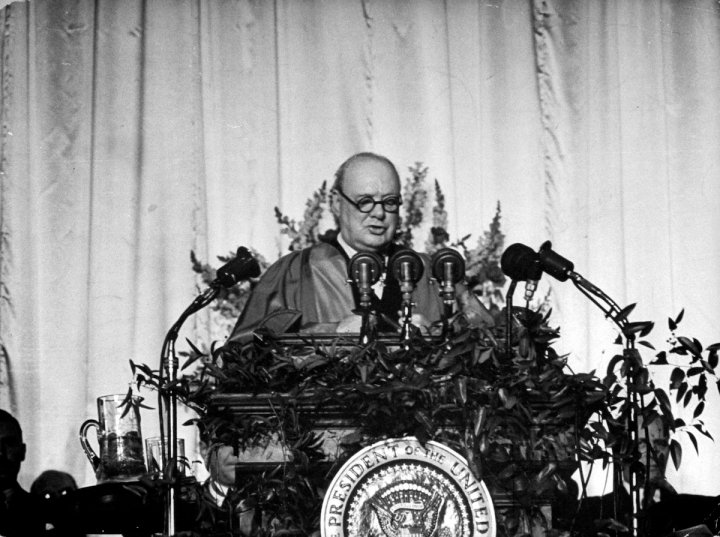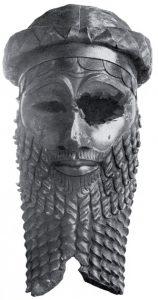“…From Stettin in the Baltic to Trieste in the Adriatic, an iron curtain has descended across the Continent…”1
Winston Churchill, Britain’s fearless Prime Minister during World War II, was an influential and inspiring leader who was reluctant to let any sort of obstacle prevent him from accomplishing his goals. Throughout his political career in Britain, Churchill held several different positions, and like any other political leader, he encountered both success and failure.2 Churchill soon became “the right leader for this dark moment in his nation’s history.”3 While Neville Chamberlain was Prime Minister of Britain, he followed a policy of appeasement with Germany. Churchill, recognizing the disaster that the appeasement policy could bring for the country, began to speak out boldly against both the policy and Adolf Hitler.4 Despite Churchill’s warnings of Hitler, Chamberlain continued to follow the policy. Eventually, following several events that proved Churchill’s premonitions about Hitler to be true, Chamberlain stepped down from his position as Prime Minister. As the fearless, outspoken leader who had continually warned his country, Churchill became a figure whom the country wanted and needed as Prime Minister; King George appointed him to the position on May 10, 1940.5
Several years later, Churchill was defeated in a landslide election, and his time as Britain’s Prime Minister came to an end in July of 1945. His loss was a surprise worldwide, considering how effective his leadership had been for Britain during World War II. After losing the election, Churchill needed an escape–something to get his mind off of the fact that “in his effort to rebuild Britain from the ashes of war, most British voters saw him as entirely unsuitable.”6 The American President Harry S. Truman, a friend of Churchill’s, requested his presence as one of Westminster College’s lecturers in “the John Findley Green Foundation lecture series…[which showcased] speakers talking about current political and economic events.”7

Truman’s invitation to Churchill served as proof that his success and status as a nation’s wartime hero would be remembered for generations to come, and also served to emphasize his “even larger and deserved status as the visionary who had foreseen victory over evil.”8
The speech that Churchill delivered on March 5, 1946 has come to be known as one of the most famous in history. His message centered around the division of Europe at the end of World War II. The division was implemented with the intention of rebuilding post-war Europe.9 This plan had the potential to cause problems between the Western Allies and the Soviet Union, and Churchill was eager to send a message of peace in his speech. Early on in his speech, in fact, Churchill claimed that “the United States…[was] in a position to remake the entire world in its own image, with the help of Britain…in opposition to ‘war and tyranny’ which threaten the ability of the average person to achieve happiness, freedom from want, and progress.”10 Furthermore, to follow up on his mention of the tyranny and war that served as opponents to the peace that Britain and the United States were trying to achieve, Churchill made mention of the fact that the United States held great responsibility because of the nuclear power it had access to.11 He said that “the United States [stood] at the pinnacle of world power…[and] with primacy in power is also joined an aweinspiring accountability to the future.”12 Churchill then effectively transitioned into an acknowledgment of the relationship that he hoped the United States and Britain would continue to have post-war. He warned his audience that “time may be short” due to an “‘iron curtain’ [that] had fallen across Eastern Europe.”13 Churchill spent the last part of his speech discussing the reality that Italy and France’s Communist parties were not to be taken lightly, stating that they were “established and work in complete unity and absolute obedience to the directions they receive from the Communist center.”14 Finally, to end his speech, he focused his audience on the message he sought to deliver from the beginning: one of peace, one of ability, and one of hope.
Overall, Churchill gave a speech that reached not only his live audience, but other leaders and engaged citizens at the time; furthermore, he was successful in delivering a message that was impactful enough to remain memorable to future generations. In his speech, he addressed important issues of the time that needed attention, he established the need (and his desire) for the collaborative relations between the United States and Britain to continue, and he appealed to the many similar opinions of American politicians and citizens. Furthermore, he provided insight into the global affairs that were happening at the time of his speech, for those that were barely developing and gaining momentum, and for those that he anticipated may happen in the near future. In fact, the world saw the start of the Cold War a mere year after Churchill delivered this speech in which he explicitly made mention of the importance and responsibility that came with nuclear weapons.

The messages present in his speech were important, some even eerily prophetic, and they remained relevant for the next several decades; his words became particularly symbolic with the construction of the Berlin Wall in 1961.15 All in all, Churchill’s speech has gone down in history as one of the most revelatory to its time. Whether referred to as the “Sinews of Peace” or the “Iron Curtain,” his speech will continue to serve as historical symbolism in relation to the events that followed his words of warning, peace, and hope.
- Cold War Reference Library, 2004, s.v. “Churchill, Winston,” Ed. by Richard C. Hanes, Sharon M. Hanes, and Lawrence W. Baker. ↵
- Global Events: Milestone Events Throughout History, 2014, s.v. “Winston Churchill Becomes Prime Minister of Great Britain.” ↵
- Cold War Reference Library, 2004, s.v. “Churchill, Winston.” ↵
- Global Events: Milestone Events Throughout History, 2014, s.v. “Winston Churchill Becomes Prime Minister of Great Britain.” ↵
- Global Events: Milestone Events Throughout History, 2014, s.v. “Winston Churchill Becomes Prime Minister of Great Britain.” ↵
- “Winston Churchill’s ‘The Sinews of Peace’,” in Milestone Documents in World History: Exploring the Primary Sources That Shaped the World, edited by Brian Bonhomme and Cathleen Boivin, 1436-1451. Milestone Documents. Vol. 4, 1942 – 2000, (Dallas, TX: Schlager Group, 2010). ↵
- “Winston Churchill’s ‘The Sinews of Peace’,” in Milestone Documents in World History: Exploring the Primary Sources That Shaped the World, edited by Brian Bonhomme and Cathleen Boivin, 1436-1451. Milestone Documents. Vol. 4, 1942 – 2000, (Dallas, TX: Schlager Group, 2010). ↵
- “Winston Churchill’s ‘The Sinews of Peace’,” in Milestone Documents in World History: Exploring the Primary Sources That Shaped the World, edited by Brian Bonhomme and Cathleen Boivin, 1436-1451. Milestone Documents. Vol. 4, 1942 – 2000, (Dallas, TX: Schlager Group, 2010). ↵
- “Winston Churchill’s ‘The Sinews of Peace’,” in Milestone Documents in World History: Exploring the Primary Sources That Shaped the World, edited by Brian Bonhomme and Cathleen Boivin, 1436-1451. Milestone Documents. Vol. 4, 1942 – 2000, (Dallas, TX: Schlager Group, 2010). ↵
- “Winston Churchill’s ‘The Sinews of Peace’,” in Milestone Documents in World History: Exploring the Primary Sources That Shaped the World, edited by Brian Bonhomme and Cathleen Boivin, 1436-1451. Milestone Documents. Vol. 4, 1942 – 2000, (Dallas, TX: Schlager Group, 2010). ↵
- “Winston Churchill Delivers the “Iron Curtain” Speech.” In Global Events: Milestone Events Throughout History, edited by Jennifer Stock, 325-329. Vol. 6, North America. Farmington Hills, MI: Gale, 2014. Gale Virtual Reference Library (accessed April 28, 2017). ↵
- Cold War Reference Library, 2004, s.v. “Churchill, Winston,” Ed. by Richard C. Hanes, Sharon M. Hanes, and Lawrence W. Baker. ↵
- “Winston Churchill’s ‘The Sinews of Peace’,” in Milestone Documents in World History: Exploring the Primary Sources That Shaped the World, edited by Brian Bonhomme and Cathleen Boivin, 1436-1451. Milestone Documents. Vol. 4, 1942 – 2000. Dallas, TX: Schlager Group, 2010. Gale Virtual Reference Library (accessed April 28, 2017). ↵
- “Winston Churchill’s ‘The Sinews of Peace’,” in Milestone Documents in World History: Exploring the Primary Sources That Shaped the World, edited by Brian Bonhomme and Cathleen Boivin, 1436-1451. Milestone Documents. Vol. 4, 1942 – 2000. Dallas, TX: Schlager Group, 2010. Gale Virtual Reference Library (accessed April 28, 2017). ↵
- “Winston Churchill Delivers the “Iron Curtain” Speech,” in Global Events: Milestone Events Throughout History, edited by Jennifer Stock, 325-329. Vol. 6, North America. Farmington Hills, MI: Gale, 2014. Gale Virtual Reference Library (accessed April 28, 2017). ↵



37 comments
Nydia Ramirez
I gained a lot of new insight and knowledge from reading this article. I had known who prominent figures like Winston Churchill and Neville Chamberlain however I did not know specific quotes Churchill had stated in his speech. This article gave me valuable insight into what was specifically said. I knew the basis of certain events talked about in the article so I was worried it would just be repetitive however, that was far from the case. My favorite thing about the article was the richness of information. It stated the main points his speech addressed as well as why and how. I always appreciate learning more about a topic I thought I knew a lot about already.
Hali Garcia
This is a very interesting article. The Cold War has always been one of my favorite eras to learn about for some reason. I really liked how the author included a video of Winston Churchill’s “Iron Curtain” speech. What struck me was how even though Churchill lost the election, he was still viewed as an incredibly important person. Nice Job!
Christopher Hohman
Nice article. Churchill’s loss in 1945 was a certainly a shock to many because as you said he was a very popular figure renowned for his leadership skills and determination to face down the Nazis. However, Churchill and the Conservative party he ran for were not the medicine Britons felt they needed at the time. The nation was tired, battered, and poor, and the Attlee government provided what many felt were meaningful solutions to those problems. Churchill’s iron curtain speech was certainly prophetic because he knew that relations between the Soviet Union and the Western allies were souring. His hope that Britain and the US would remain close may have been an acknowledgement that Britain would need the United States if it hoped to rebuild and move once again towards prosperity in the post war world.
Karla Fabian
The cold-war has always been a great interest for me, and this article helped me learn a lot more. It is very intriguing to understand how even though the speech was done many years ago, it is still memorable to future generations. It is very interesting to see how Churchill’s speech anticipated the Cold War since he mentioned the United States’ responsibility for nuclear weapons. It can be considered that his speech was in some form of warning. Also, it is very intriguing to see how even though Churchill was not elected as a prime minister, he still cared about Britain’s relations with other countries. In his speech, he ascertains a fondness for the collaborative relations between the United States and Britain to continue. This speech and the impact it had is a reminder of how powerful and influential Winston Churchill was.
Paulina Gonzalez
The cold war is an interesting time in history and writing an article about Churchchills’s Iron Curtain speech really defines this time period. It’s a well-written article that emphasizes how important of a political figure Churchill is for not only England but also for other countries. Churchill is by far one of the most influential politicians even when he wasn’t reelected as prime minister. Even if he wasn’t reelected it still shows how powerful and the impact the speech left.
Aaron Sandoval
I really enjoyed reading this article, Cold War-era has always been one of my favorite periods in World History, and when studying Cold War history it is impossible to overlook Winston Churchill and his Iron Curtain speech. I really enjoyed how the author of this article brought up Churchill’s defeat in the 1945 election because it shows that even after he was removed from office, he was still seen as an incredibly important figure, and probably will still be viewed as an important figure for years to come.
Samuel Vega
Sometimes things have a way of working out for the best. While I am sure Churchill was disappointed, he was not reelected as Prime Minister of Britain; his power and influence appears to have had a greater purpose. You must wonder, if Churchill had been reelected, would he have been able to deliver his now famous speech? Would his speech have carried the same impact? The speech might have been seen as self-serving to Britain.
Jose Chaman
This article is really interesting. Winston Churchill will always be remembered with some ambiguity for the rest of the story, however, as this article argues, his influence power was great. The Iron Curtain, or in German, Eiserner Vorhang, divided Western from Eastern Europe during the rest of the 20th century, and had severe socio-political repercussions on all continents of the world. However, Churchill claimed peace and security, but this Iron Curtain, as many testimonies show, also brought fear and instability to Eastern Europe.
Todd Brauckmiller Jr.
No doubt that Churchill was one of the most iconic figures during the WWII era. His speech was a very powerful message that wholeheartedly spoke the truth of his people. Britain has gone through so much during the war and were great allies in support to push back the Nazi forces. Very shocking to see the once ally Russia to become our next foe in the cold war. To think he lost an election is very surprising to me, though his people did what they thought were right.
Uzziyah Cohen
Reading this article brought to mind a book that I recently read entitled “Your One Word” by Evan Carmichael. In the book, the author quotes Winston Churchill in one of his famous speeches regarding the establishment of a new government after being appointed by the king. Winston Churchill is by far one of the greatest orators of our time, and some of his most memorable speeches have gone down in history to not only become impactful in their times but also quoted by many people across many nations. John Winston Churchill’s speech he mentioned the concept of one word to embody his entire approach to conflict with Germany and that word was– Victory! As a speaker and as a leader it is impressive that Winston Churchill was able to summarize his agenda and motivate his countrymen with such eloquent words.